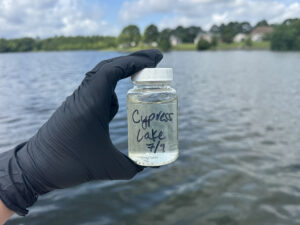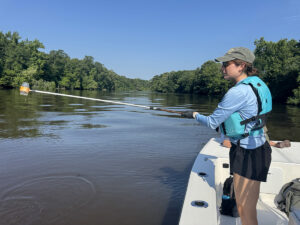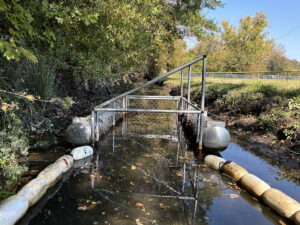News

Press Release from the Southern Environmental Law Center
For Immediate Release, February 8, 2018
CONTACT: Kym Hunter, Southern Environmental Law Center – 919 967 1450
Less Costly, Comprehensive Alternative to $2.2 Billion Extension of 540 Toll Road by Engineer Released
CHAPEL HILL, N.C – On behalf of Sound Rivers and Clean Air Carolina, the Southern Environmental Law Center today released a report by expert transportation engineer Walter Kulash detailing a comprehensive suite of transportation upgrades that would provide a less expensive, less damaging alternative to the proposed $2.2 billion extension of the 540 Toll Road.
The alternative solution relies on upgrading existing roads and innovative transportation improvements to reduce congestion throughout the Complete 540 project area. It would cost almost $2B less than NCDOT’s proposed toll road extension of 540 at just $293.7 million above already-planned improvements. And unlike the 540 extension, the alternative would be open to all- not just those who can afford to pay an expensive toll for each use, which is why supporters are calling it ACCESS2040. 2040 is the year used by transportation planners in developing the region’s transportation plan for the coming decades, which ACCESS 2040 seeks to complement.
“NCDOT’s proposed toll road improves travel times for a very few drivers and is actually projected by the department to make congestion on existing highways worse.” said Kym Hunter, an attorney at the Southern Environmental Law Center. “The negligible time-savings cannot justify the multi-billion dollar cost. Importantly, this alternative solution would save time for all drivers in the area, regardless of their ability to pay a toll, and at a much lower overall cost.”
ACCESS2040 would widen key north-south and east-west road corridors in Southeastern Wake County, including Tryon Road, Ten Ten Road, NC 55, NC 42, Holly Springs Road, Lake Wheeler Road, US 401, and NC 50. It also “anticipates an increase in transit travel as projected by the Wake County Transit Plan and the GoRaleigh five-year transit improvement plan,” which is a factor not considered in NCDOT’s proposal for the toll road. NCDOT’s own data indicate that this alternative plan would outperform the $2.2B Complete 540 in reducing traffic congestion on existing roadways in Southeastern Wake County.
“ACCESS 2040 is a common-sense solution to Wake County’s transportation needs,” said Matthew Starr with Sound Rivers. “It’s affordable, accessible to all, and would not cause the unprecedented level of destruction to water quality and wetlands we will see from NCDOT’s toll road proposal.”
NCDOT’s proposed toll road would pave over 60 acres of wetlands, cross more than 55,000 feet of streams and cut through habitat essential to rare and endangered aquatic species. ACCESS 2040 would avoid this destruction and instead help preserve the natural beauty of Southeastern Wake County.
“Unlike the outdated toll road proposal, ACCESS2040 acknowledges our changing transportation and community preferences,” said June Blotnick, executive director of Clean Air Carolina. “In the very near future, we will be looking to autonomous vehicles and ride-sharing to help meet our transportation needs. And we are already seeing a shift to downtown urban living and an emphasis on strong public transit systems. Giant highway loops represent an outdated model contributing to increased air pollution and should be consigned to the past.”
The conservation groups point to economic development opportunities ignited when cities turn their emphasis to fostering walkable, bikeable vibrant communities rather than sprawl. Companies like Amazon and Apple have been clear that they value these qualities as they search for a new headquarters.
“We urge Governor Cooper and Secretary Trogdon to hit pause on their plans for the proposed 540 toll road and carefully consider their lower-cost, less-damaging option that preserves a high quality of life in Wake County” said Hunter.
Read more on SELC’s website here.
###
About the Southern Environmental Law Center
The Southern Environmental Law Center is a regional nonprofit using the power of the law to protect the health and environment of the Southeast (Virginia, Tennessee, North and South Carolina, Georgia, and Alabama). Founded in 1986, SELC’s team of almost 60 legal and policy experts represent more than 100 partner groups on issues of climate change and energy, air and water quality, forests, the coast and wetlands, transportation, and land use.
WEB: www.SouthernEnvironment.org
About Sound Rivers
The mission of Sound Rivers is to monitor and protect the Neuse and Tar-Pamlico River watersheds covering nearly one quarter of North Carolina, and to preserve the health and beauty of the river basin through environmental justice.
WEB: https://soundrivers.org
About Clean Air Carolina
Clean Air Carolina is a statewide organization working to ensure cleaner air quality for all North Carolinians through education and advocacy and by working with its partners to reduce sources of pollution.
WEB: www.cleanaircarolina.org
Related News

Specialist investigates lake connection to mysterious skin rash
July 10th 2025

Riverkeeper: Central NC flooding part of a much larger issue
July 10th 2025

N.C. Governor vetoes bad rulemaking bill
July 10th 2025

Riverkeeper, program director ‘Growing More than Rain Gardens’
July 10th 2025

Volunteer coordinator goes ‘fishing’
July 10th 2025

Neuse fish kill expected to extend beyond holiday weekend
July 3rd 2025

Swim Guide fails prompt Maple Cypress investigation
July 3rd 2025

Riverkeeper, town partners root out source of Smithfield sediment pollution
July 3rd 2025

